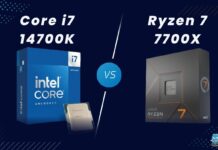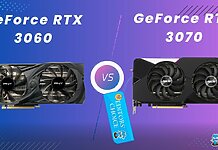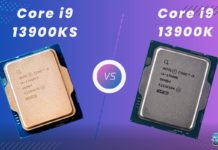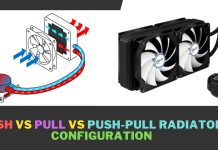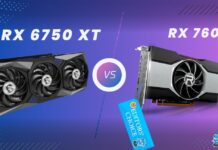After putting Intel’s Core i7-1360P and Core i7-12700H CPUs against Apple’s M2 chip, we’re now comparing the two against each other. Learn if the power-efficient Raptor Lake chip stands a chance against a high-performance Alder Lake chip. Let’s get into it and compare Core i7-1360P vs Core i7-12700H.
Key Takeaways
- Starting with the processing node, both the mobile CPUs are built on the Intel 7 (10nm) manufacturing process.
- The Core i7-12700H is about 20.4% faster in multi-core applications, while the Core i7-1360P takes the crown by 5.2% in single-core performance.
- The Core i7-12700H yields better value in both multi-core (73.4%) and single-core (47.8%) performance.
Comparison Table
| Mobile CPU | Core i7-1360P | Core i7-12700H |
|---|---|---|
| Architecture | Willow Cove | Hybrid Core |
| Codename | Raptor Lake-P | Alder Lake-S |
| Instruction Set | x86-64 | x86-64 |
| Processing Node | Intel 7 (10nm) | Intel 7 (10nm) |
| Socket | BGA-1744 | BGA-1744 |
| No. of Cores | 12 (4P + 8E) | 14 (6P + 8E) |
| No. of Threads | 16 (8 + 8) | 20 (12 + 8) |
| Base Clock |
|
|
| Boost Clock |
|
|
| L1 Cache | 80KB per core | 80KB per core |
| L2 Cache | 2MB per core | 1280KB per core |
| L3 Cache | 18MB (shared) | 24MB (shared) |
| Memory Support |
|
|
| Memory Size | Up to 64GB | Up to 64GB |
| PCIe Revision | 4.0 | 4.0 |
| No. of PCIe Lanes | 20 | 28 |
| Overclocking Support | No | No |
| Integrated Graphics | Intel Iris Xe Graphics | Intel Iris Xe Graphics |
| GPU Base Clock | 300MHz | 300MHz |
| GPU Boost Clock | 1500MHz | 1400MHz |
| Shaders | 768 | 768 |
| TMUs | 48 | 48 |
| ROPs | 24 | 24 |
| Execution Units | 96 | 96 |
| iGPU Theoretical Performance |
1.69 TFLOPs | 1.69 TFLOPs |
| Total Graphics Power | 15W | 15W |
| CPU Max Operating Temperature | 100°C | 100°C |
| CPU Base Power | 20-28W (configurable) | 35-45W (configurable) |
| CPU Boost Power | 64W | 115W |
| Launch Date | January 3, 2023 | January 4, 2022 |
Architectural Differences:
- Core/Thread Counts: The Core i7-12700H has 14 cores, including 6 P-cores and 8 E-cores, along with 20 threads. In contrast, the Core i7-1360P has 12 cores with 4 P-cores and 8 E-cores, totaling 16 threads.
- Clock Speeds: Regarding base frequencies, the Core i7-1360P clocks 2.2GHz (P-cores) and 1.6GHz (E-cores). The Core i7-12700H betters that by 100MHz, with 2.3GHz and 1.7GHz, respectively. As for boost frequencies, the Core i7-1360P can push its P-cores to 5GHz and the E-cores to 3.7GHz. On the other hand, the Core i7-12700H clocks 4.7GHz (E-cores) and 3.5GHz (E-cores).
- Memory: The Core i7-1360P improves DDR5 support (up to 6400 MT/s) and adds LPDDR5x support. Meanwhile, the Core i7-12700H only supports DDR5 speeds up to 5200 MT/s and does not have LPDDR5x support.
- Cache: The Core i7-12700H has an impressive 24MB pool of L3 cache compared to 16MB of the Core i7-1360P.
- TDP: The Core i7-12700H (the H-suffix stands for high-performance) draws 35W to 45W at the base and up to 115W on boost frequencies. In comparison, the Core i7-1360P (P for power efficiency) uses 20W to 28W at the base and as much as 64W in boost mode.
Related: Core i7-1360P Vs Apple M2
Core i7-1360P Vs Core i7-12700H: Performance Benchmarks
Cinebench R23
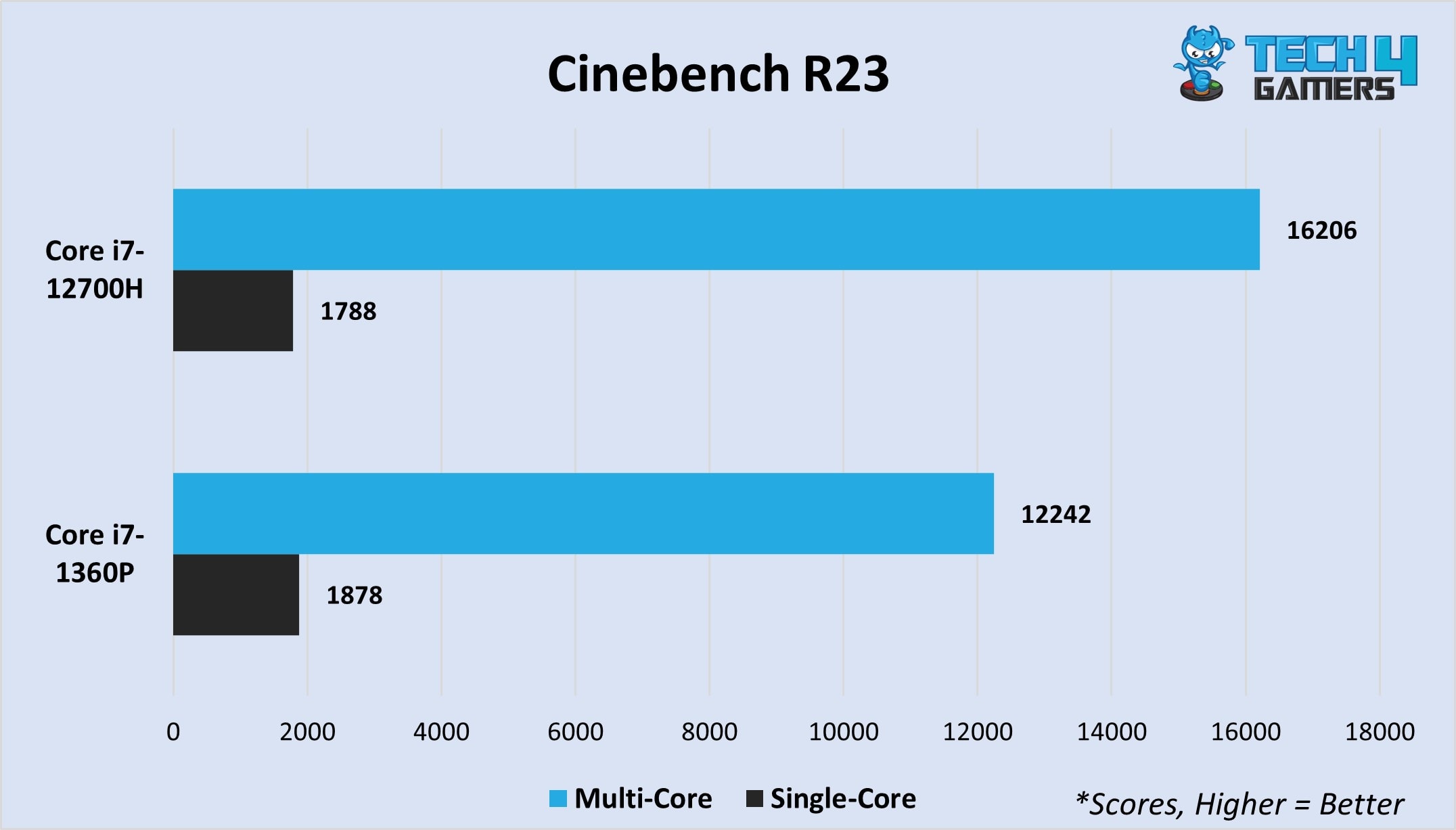
- Starting with the Cinebench R23 multi-core test, the Core i7-12700H records 16206 points. In reply, the Core i7-1360P managed 12242 points. (a 32.3% difference)
- The Core i7-1360P is the better CPU in the single-core test with 1878 points, over 1788 of the Core i7-12700H.
Geekbench 5
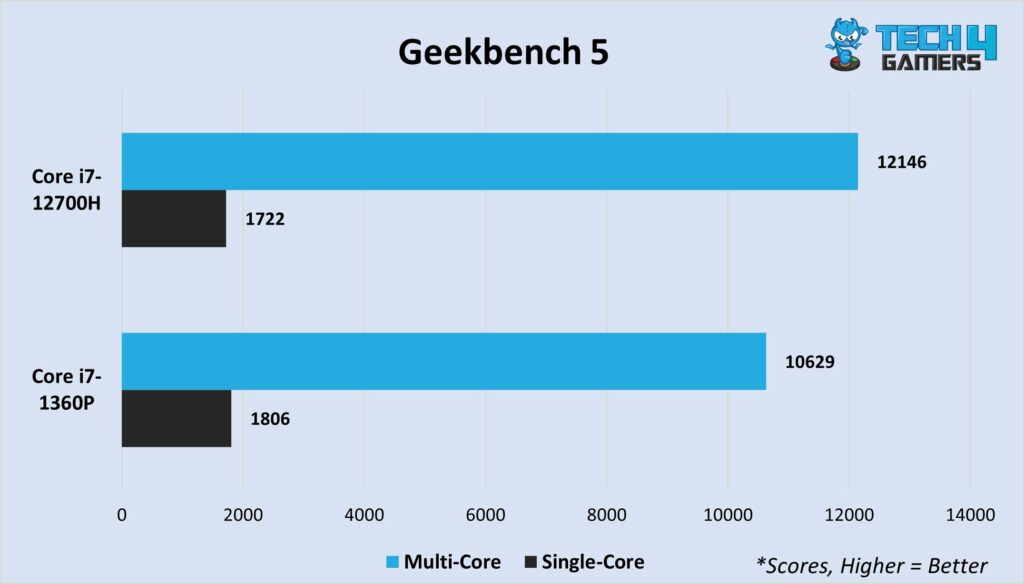
- Moving on to Geekbench 5, the Core i7-12700H racked up 12146 multi-core points compared to 10629 points scored by the Core i7-1360P.
- Again, the Core i7-1360P shifted the tide and scored 1806 single-core points. It leads by 4.8%, as the Core i7-12700H scored 1722 points.
Also Check: Core i7 1360P Vs Core i7 13700H
Geekbench 6
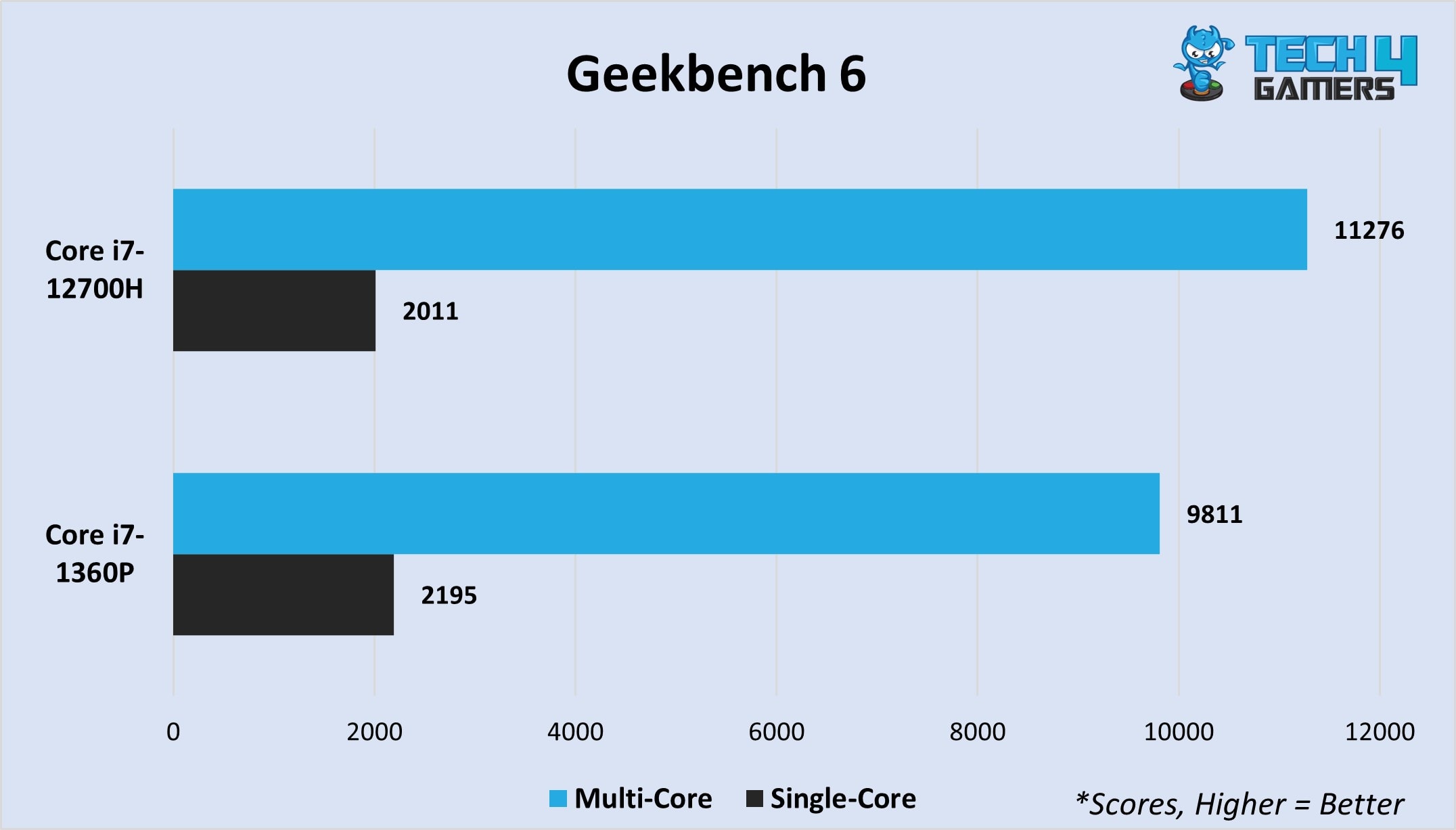
- In Geekbench 6, the Core i7-12700H scored 11276 points as far as the multi-core test is concerned. In comparison, the Core i7-1360P managed 9811 points.
- Meanwhile, the single-core test sees the Intel Core i7-1360P score 2195 points in reply to 2011 points of the Core i7-12700H.
Passmark
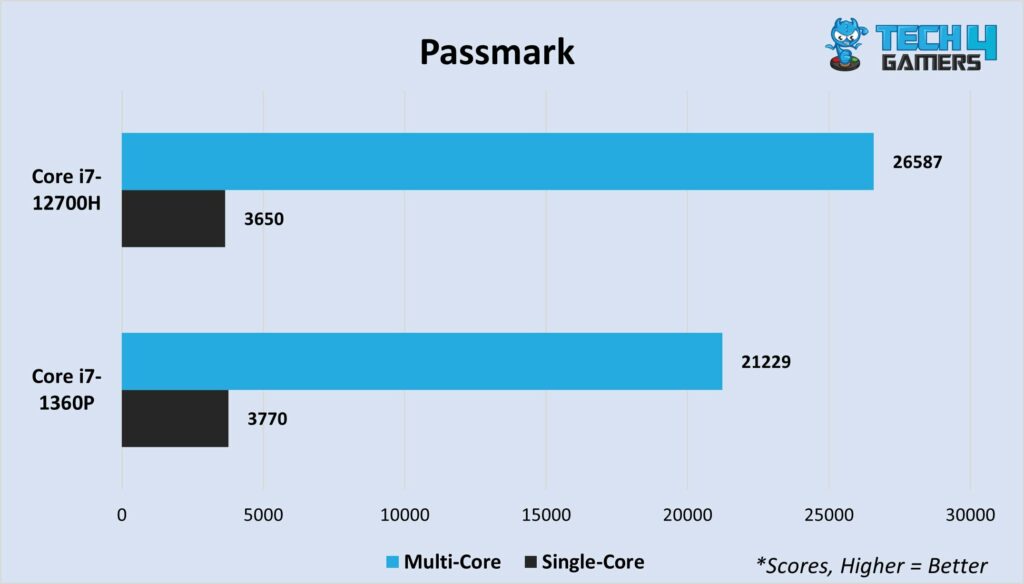
- The last application is Passmark, in which Core i7-12700H accumulated 26587 multi-core points. Conversely, the Core i7-1360P scored 21229 points.
- As for the single-core results, the Core i7-1360P (3770 points) reigned supreme again over the Core i7-12700H (3650 points).
Similar Comparison: Core i7-1360P Vs Core i5-1340P
Overall Performance
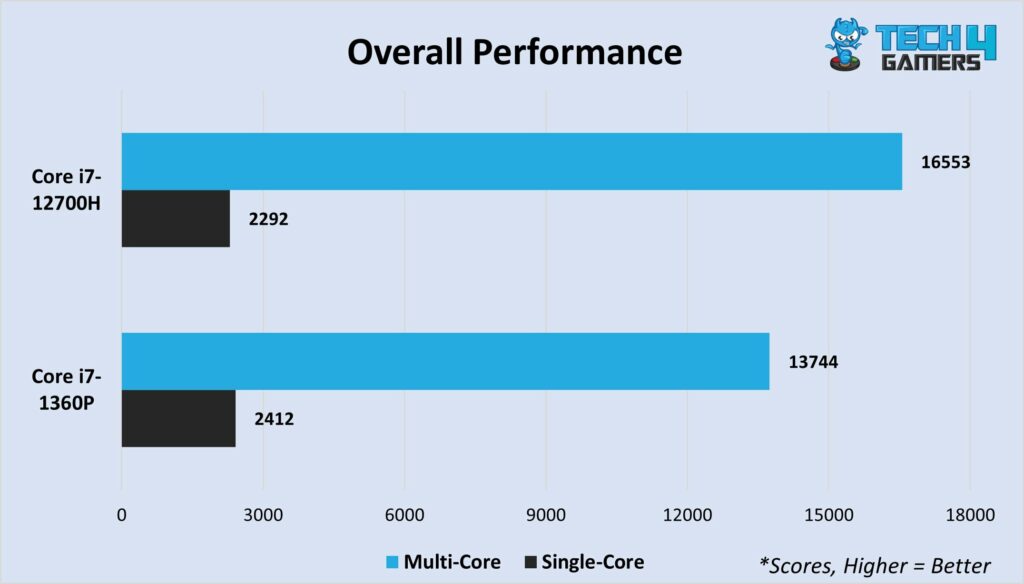
- Multi-core Performance: The Core i7-12700H averaged 16553 points over the four tests, bettering the Core i7-1360P’s score of 13744. Hence, the Core i7-12700H is approximately 20.4% faster than the Core i7-1360P.
- Single-core Performance: The single-core results show the Core i7-1360P averaging 2412 points over the three applications. Contrastingly, the Core i7-12700H averaged 2292 points. So, the Core i7-1360P is the better single-core performer by 5.2%.
Core i7-12700H Vs Core i7-1360P: Which One Provides Better Value?
After discussing the performance and prices, we can estimate which CPU has better value. Firstly, the Core i7-1360P is the better single-core performer (5.2%), whereas the Core i7-12700H is better in multi-core applications (20.4%). Secondly, Core i7-12700H laptops are cheaper than Core i7-1360P laptops.
The cheapest Core i7-12700H costs nearly 53% less than the cheapest Core i7-1360P laptop. This huge price difference negates the much smaller performance advantage of the Core i7-1360P in single-core applications.
Considering that, the Core i7-12700H has better value in multi-core (73.4%) and single-core (47.8%) applications.
Similar Read: Core i7-12700H Vs Core i7-1255U
Final Thoughts
That’s the end of my Core i7-1360P vs Core i7-12700H comparison. My findings say the Core i7-12700H has more value than the Core i7-1360P. As the Core i7-1360P is still very recent, the laptops haven’t dropped in price much.
Conversely, Core i7-12700H laptops are much cheaper than their initial launch prices. Thus, the high-performance Core i7-12700H has more value in both multi-core and single-core performance.
If you need a powerful yet power-efficient laptop, the Core i7-1360P is an excellent CPU to go for. However, waiting for the next generation might be good, so the prices of the current-gen laptops will drop. In any case, I hope this guide has been helpful to you.
Also Read: Core i7 13700H Vs Core i7 12700H
Pros And Cons
| CPU | Pros | Cons |
|---|---|---|
| Core i7-1360P |
|
|
| Core i7-12700H |
|
|
Thank you! Please share your positive feedback. 🔋
How could we improve this post? Please Help us. 😔
[Hardware Reviewer]
Hi! I’m Ali Tauseef, and I have been writing for Tech4Gamers since 2022. I love all things computer hardware but am particularly fond of CPUs and motherboards, and I like to stay up-to-date about the latest advancements in these worlds, and when possible, write about it. When I’m not doing that, I like to get into a little FPS action in CS2 or get lost in the vast world of RDR2.
Get In Touch: ali@tech4gamers.com


 Threads
Threads